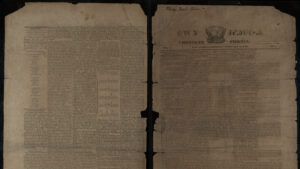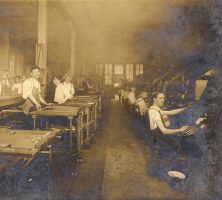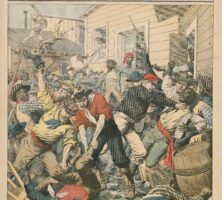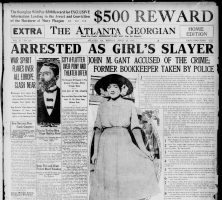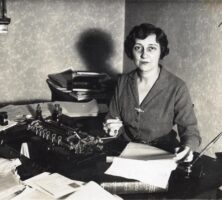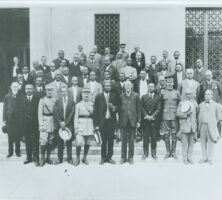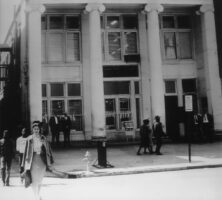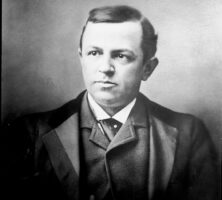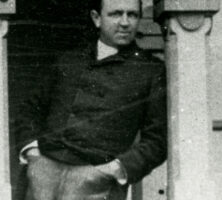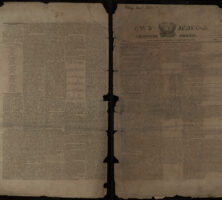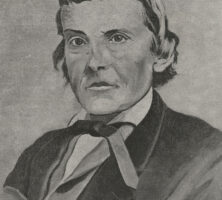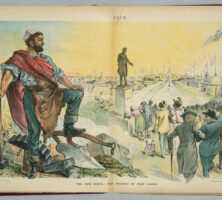The New Georgia Encyclopedia is supported by funding from A More Perfect Union, a special initiative of the National Endowment for the Humanities.
Famed newspaper magnate William Randolph Hearst purchased the Atlanta Georgian in 1912, expanding his media empire into the South for the first time. Hearst brought in staff from his other newspaper holdings across the country to populate the Atlanta newsroom and, by 1914, it had surpassed the Atlanta Constitution in circulation, making it the second most popular newspaper in Atlanta for a brief period.
Courtesy of Special Collections & Archives, Georgia State University Library, Edmond Torbush Papers, Southern Labor Archives.
The New Georgia Encyclopedia does not hold the copyright for this media resource and can neither grant nor deny permission to republish or reproduce the image online or in print. Requests for permission to publish or reproduce the resource should be submitted to Special Collections and Archives at Georgia State University.
The race massacre of 1906 made international headlines and threatened Atlanta's image as a thriving New South city. The incident, sparked by sensationalized accounts of Black violence, lasted for two nights and resulted in dozens of Black deaths. It was reported in the October 7, 1906, issue of the French publication Le Petit Journal. The original caption translates as "Lynchings in the United States."
The New Georgia Encyclopedia does not hold the copyright for this media resource and can neither grant nor deny permission to republish or reproduce the image online or in print. All requests for permission to publish or reproduce the resource must be submitted to the rights holder.
The Atlanta Georgian, which circulated daily from 1906 to 1939, was the first newspaper in the South owned by William Randolph Hearst and the most prominent example of yellow journalism in Georgia. Under his ownership, the paper expanded circulation to eight or more editions a day and printed increasingly scandalous headlines and illustrations that dramatized local crimes in Atlanta.
Courtesy of Digital Library of Georgia.
The New Georgia Encyclopedia does not hold the copyright for this media resource and can neither grant nor deny permission to republish or reproduce the image online or in print. Requests for permission to publish or reproduce the resource may need to be submitted to the Digital Library of Georgia.
Mildred Seydell was one of the first women in Georgia to work as a professional journalist. A native of Atlanta, Seydell began her career as a correspondent for a West Virginia newspaper before being hired in 1924 as a society-page writer for the Atlanta Georgian.
Courtesy of Stuart A. Rose Manuscript, Archives, and Rare Book Library, Emory University, Mildred Seydell Papers.
The New Georgia Encyclopedia does not hold the copyright for this media resource and can neither grant nor deny permission to republish or reproduce the image online or in print. For more information about this resource, contact the Stuart A. Rose Manuscript, Archives, and Rare Book Library at Emory University.
Mirabeau B. Lamar established the Columbus Enquirer as a four-page weekly newspaper in 1828, the same year the Georgia legislature incorporated the city of Columbus. The issue seen here dates from May of that year.
Courtesy of Digital Library of Georgia.
The New Georgia Encyclopedia does not hold the copyright for this media resource and can neither grant nor deny permission to republish or reproduce the image online or in print. Requests for permission to publish or reproduce the resource may need to be submitted to the Digital Library of Georgia.
Julian Harris, editor and co-owner, with his wife, Julia, of the Columbus Enquirer-Sun, reads mail at his desk in the late 1920s. Harris, the son of Georgia folklorist Joel Chandler Harris, and his wife jointly won a Pulitzer Prize in 1926 for their reporting in the Enquirer-Sun on state officials with ties to the Ku Klux Klan.
Courtesy of Georgia Archives, Vanishing Georgia, #
ful0939-85.
The New Georgia Encyclopedia does not hold the copyright for this media resource and can neither grant nor deny permission to republish or reproduce the image online or in print. Requests for permission to publish or reproduce the resource should be submitted to the Georgia Archives.
The Ledger-Enquirer Building, seen here in the 1930s, was designed by local architecture firm Smith & Biggers. The building was purchased by Columbus State University in 2014.
Courtesy of Atlanta Journal-Constitution.
The New Georgia Encyclopedia does not hold the copyright for this media resource and can neither grant nor deny permission to republish or reproduce the image online or in print. All requests for permission to publish or reproduce the resource must be submitted to the Atlanta Journal-Constitution.
Atlanta Constitution journalists and Pulitzer Prize winners Gene Patterson (left), Ralph McGill (center), and Jack Nelson are pictured circa 1967, the year Patterson received the award.
Courtesy of Atlanta Journal-Constitution.
The New Georgia Encyclopedia does not hold the copyright for this media resource and can neither grant nor deny permission to republish or reproduce the image online or in print. All requests for permission to publish or reproduce the resource must be submitted to the Atlanta Journal-Constitution.
Gene Patterson, pictured in 2002, was an influential editor of the Atlanta Constitution during the civil rights movement and later founded Georgia Trend magazine.
Courtesy of Atlanta Journal-Constitution.
The New Georgia Encyclopedia does not hold the copyright for this media resource and can neither grant nor deny permission to republish or reproduce the image online or in print. All requests for permission to publish or reproduce the resource must be submitted to the Atlanta Journal-Constitution.
J. Richardson Jones, an Atlanta native, was a journalist, filmmaker, and entertainer whose work both challenged segregation and celebrated African American life during the Jim Crow era.
Courtesy of Atlanta History Center.
The New Georgia Encyclopedia does not hold the copyright for this media resource and can neither grant nor deny permission to republish or reproduce the image online or in print. Requests for permission to publish or reproduce the resource should be submitted to the Atlanta History Center.
J. Richardson Jones, kneeling right, is pictured on a handbill from the 1925 production of his play Thy Will Be Done at the Strand Theatre in Jacksonville, Florida. The play was later produced in July 1926 at the Douglass Theatre in Macon. An Atlanta native, Jones began his career in vaudeville and radio, and later became a journalist for the Atlanta Daily World.
Courtesy of Middle Georgia Archives, Washington Memorial Library.
The New Georgia Encyclopedia does not hold the copyright for this media resource and can neither grant nor deny permission to republish or reproduce the image online or in print. Requests for permission to publish or reproduce the resource may need to be submitted to the Middle Georgia Archives at Washington Memorial Library.
A poster advertises Parade of Negro Progress, a Technicolor feature film based on a short newsreel produced in 1939 by J. Richardson Jones as an advertisement for the Atlanta Life Insurance Company. The feature played in all-Black theaters around the South in 1941-42.
Courtesy of Archives Division, Auburn Avenue Research Library on African American Culture and History, Atlanta-Fulton Public Library System
The New Georgia Encyclopedia does not hold the copyright for this media resource and can neither grant nor deny permission to republish or reproduce the image online or in print. All requests for permission to publish or reproduce the resource must be submitted to the rights holder.
Emmeline Southall Scott is surrounded by her sons in a family photograph. From left: Emel Julius, Aurelius Southall, Lewis Augustus, William Alexander (W. A.) II, Cornelius Adolphus (C. A.), and Daniel Marcellus. W. A. Scott founded the Atlanta World (later Atlanta Daily World) in 1928, around the time this photograph was taken. C. A. Scott assumed the editorship in 1934, following his brother's death.
Courtesy of Atlanta Daily World
The New Georgia Encyclopedia does not hold the copyright for this media resource and can neither grant nor deny permission to republish or reproduce the image online or in print. All requests for permission to publish or reproduce the resource must be submitted to the rights holder.
M. Alexis Scott, president of the Atlanta Daily World, speaks at one of three newsstands that opened at the Hartsfield-Jackson Atlanta International Airport in 2009. Scott is the granddaughter of W. A. Scott II, who founded the newspaper in 1928.
Courtesy of Atlanta Daily World. Photograph by Willie E. Tucker Jr.
The New Georgia Encyclopedia does not hold the copyright for this media resource and can neither grant nor deny permission to republish or reproduce the image online or in print. All requests for permission to publish or reproduce the resource must be submitted to the rights holder.
The Atlanta Daily World, Atlanta's oldest African American newspaper, was established in 1928 by W. A. Scott II. The paper has remained in the hands of the Scott family since its founding.
Photograph by Wally Gobetz
The New Georgia Encyclopedia does not hold the copyright for this media resource and can neither grant nor deny permission to republish or reproduce the image online or in print. All requests for permission to publish or reproduce the resource must be submitted to the rights holder.
William Alexander (W. A.) Scott II founded the Atlanta World newspaper in 1928. In 1932 the publication became the Atlanta Daily World, one of the nation's first Black daily newspapers.
Courtesy of Atlanta Daily World
The New Georgia Encyclopedia does not hold the copyright for this media resource and can neither grant nor deny permission to republish or reproduce the image online or in print. All requests for permission to publish or reproduce the resource must be submitted to the rights holder.
Cornelius Adolphus (C. A.) Scott served as editor of the Atlanta Daily World from 1934 until his retirement in 1997. Although more conservative than many Black editors of his time, Scott spoke out about Georgia's white primary system and advocated school integration and Black suffrage in the pages of the newspaper.
Courtesy of Atlanta Daily World. Photograph by Griff Davis
The New Georgia Encyclopedia does not hold the copyright for this media resource and can neither grant nor deny permission to republish or reproduce the image online or in print. All requests for permission to publish or reproduce the resource must be submitted to the rights holder.
The New Georgia Encyclopedia does not hold the copyright for this media resource and can neither grant nor deny permission to republish or reproduce the image online or in print. All requests for permission to publish or reproduce the resource must be submitted to the rights holder.
M. Alexis Scott became president and chair of the board of directors for the Atlanta Daily World in 1997, after twenty years as a journalist with the Atlanta Journal-Constitution and Cox Enterprises. Her grandfather W. A. Scott founded the publication, Atlanta's oldest Black newspaper, in 1928.
Courtesy of Atlanta Daily World
The New Georgia Encyclopedia does not hold the copyright for this media resource and can neither grant nor deny permission to republish or reproduce the image online or in print. All requests for permission to publish or reproduce the resource must be submitted to the rights holder.
The New Georgia Encyclopedia does not hold the copyright for this media resource and can neither grant nor deny permission to republish or reproduce the image online or in print. All requests for permission to publish or reproduce the resource must be submitted to the rights holder.
The New Georgia Encyclopedia does not hold the copyright for this media resource and can neither grant nor deny permission to republish or reproduce the image online or in print. All requests for permission to publish or reproduce the resource must be submitted to the rights holder.
Natasha Trethewey, a graduate of the University of Georgia and professor at Emory University, won the Pulitzer Prize in poetry for her third collection of poems, Native Guard (2006).
The New Georgia Encyclopedia does not hold the copyright for this media resource and can neither grant nor deny permission to republish or reproduce the image online or in print. All requests for permission to publish or reproduce the resource must be submitted to the rights holder.
Journalist Ralph McGill won the Pulitzer Prize for editorial writing in 1959. As editor and publisher of the Atlanta Constitution, McGill broke the code of silence on the subject of segregation.
Courtesy of Atlanta Journal-Constitution.
The New Georgia Encyclopedia does not hold the copyright for this media resource and can neither grant nor deny permission to republish or reproduce the image online or in print. All requests for permission to publish or reproduce the resource must be submitted to the Atlanta Journal-Constitution.
Mike Luckovich, a native of Seattle, Washington, became the editorial cartoonist for the Atlanta Journal-Constitution in 1989. Luckovich has twice won the Pulitzer Prize, in 1995 and 2006, for his nationally syndicated work.
Courtesy of Atlanta Journal-Constitution.
The New Georgia Encyclopedia does not hold the copyright for this media resource and can neither grant nor deny permission to republish or reproduce the image online or in print. All requests for permission to publish or reproduce the resource must be submitted to the Atlanta Journal-Constitution.
Margaret Mitchell's epic Civil War love story, Gone With the Wind, was published in June 1936. Mitchell was awarded the Pulitzer Prize for the novel in May 1937.
Courtesy of Atlanta Journal-Constitution.
The New Georgia Encyclopedia does not hold the copyright for this media resource and can neither grant nor deny permission to republish or reproduce the image online or in print. All requests for permission to publish or reproduce the resource must be submitted to the Atlanta Journal-Constitution.
John H. Deveaux, a native of Savannah, was the first owner and editor of the Colored Tribune, which he founded in 1875. In 1878 he was forced to close the paper because white printers in the city refused to print it, but he reopened the publication, known today as the Savannah Tribune, in 1886.
Courtesy of Savannah Tribune
The New Georgia Encyclopedia does not hold the copyright for this media resource and can neither grant nor deny permission to republish or reproduce the image online or in print. All requests for permission to publish or reproduce the resource must be submitted to the rights holder.
Sol C. Johnson, the second editor and owner of the Savannah Tribune, was a Savannah native. During his long editorship, from 1889 until 1954, the newspaper covered the injustices of the Jim Crow era, including segregation, lynchings, and the convict lease system.
Courtesy of Savannah Tribune
The New Georgia Encyclopedia does not hold the copyright for this media resource and can neither grant nor deny permission to republish or reproduce the image online or in print. All requests for permission to publish or reproduce the resource must be submitted to the rights holder.
The New Georgia Encyclopedia does not hold the copyright for this media resource and can neither grant nor deny permission to republish or reproduce the image online or in print. All requests for permission to publish or reproduce the resource must be submitted to the rights holder.
The Colored Tribune, a weekly newspaper in Savannah, was founded in 1875 as the by John H. Deveaux, whose stated purpose was to defend "the rights of colored people, and their elevation to the highest plane of citizenship."From the Georgia Newspaper Project.
Courtesy of Digital Library of Georgia.
The New Georgia Encyclopedia does not hold the copyright for this media resource and can neither grant nor deny permission to republish or reproduce the image online or in print. Requests for permission to publish or reproduce the resource may need to be submitted to the Digital Library of Georgia.
In 1973 Robert E. James, pictured in 2008, reestablished the , which had closed in 1960. He served as owner and publisher of the newspaper until 1983, when his wife, Shirley B. James, became the publisher and sole owner.
Courtesy of Savannah Tribune
The New Georgia Encyclopedia does not hold the copyright for this media resource and can neither grant nor deny permission to republish or reproduce the image online or in print. All requests for permission to publish or reproduce the resource must be submitted to the rights holder.
Shirley B. James, pictured in 2008, has owned and published the Savannah Tribune since 1983. Under her direction, the newspaper covers local and national news of interest to the African American community in Savannah.
Courtesy of Savannah Tribune
The New Georgia Encyclopedia does not hold the copyright for this media resource and can neither grant nor deny permission to republish or reproduce the image online or in print. All requests for permission to publish or reproduce the resource must be submitted to the rights holder.
Robert S. Abbott, a Georgia native, was a prominent journalist who founded the Chicago Defender in 1905. He is pictured (second row, fifth from right) in June 1918 at a meeting of Black leaders in Washington, D.C. Prominent historian and educator W. E. B. Du Bois stands in the first row, fourth from the right.
Courtesy of Special Collections and University Archives, University of Massachusetts Amherst Libraries
The New Georgia Encyclopedia does not hold the copyright for this media resource and can neither grant nor deny permission to republish or reproduce the image online or in print. All requests for permission to publish or reproduce the resource must be submitted to the rights holder.
A newsboy sells copies in April 1942 of the Chicago Defender, a leading Black newspaper founded in 1905 by Georgia native Robert S. Abbott. The publication covered events and issues in Chicago's Black community, but also reported on racial news from the South and encouraged southern Blacks to move north after World War I.
Courtesy of Library of Congress, Prints and Photographs Division
The New Georgia Encyclopedia does not hold the copyright for this media resource and can neither grant nor deny permission to republish or reproduce the image online or in print. All requests for permission to publish or reproduce the resource must be submitted to the rights holder.
The Georgia Historical Society erected a historical marker at the site of newspaper editor Robert S. Abbott's childhood home in Savannah on August 26, 2008. In 1905 Abbott founded the Chicago Defender, which quickly became one of the most important Black newspapers in the first half of the twentieth century.
Courtesy of Georgia Historical Society, Historical Marker Program.
The New Georgia Encyclopedia does not hold the copyright for this media resource and can neither grant nor deny permission to republish or reproduce the image online or in print. All requests for permission to publish or reproduce the resource must be submitted to Georgia Historical Society.
John H. Sengstacke (right), a Savannah native and nephew of Robert S. Abbott, assumed management of the Chicago Defender in 1940 upon the death of Abbott, who founded the newspaper in 1905. Sengstacke is pictured in March 1942 at the Defender's office in Chicago.
Courtesy of Library of Congress, Prints and Photographs Division, Farm Security Administration - Office of War Information Photograph Collection, #LC-USW3-000802-D.
The New Georgia Encyclopedia does not hold the copyright for this media resource and can neither grant nor deny permission to republish or reproduce the image online or in print. All requests for permission to publish or reproduce the resource must be submitted to the rights holder.
The Atlanta Business Chronicle, founded by Bob Gray and Mike Weingart in 1978, is a weekly journal that covers business and industry news in Atlanta. Today the publication is owned by American City Business Journals.
The New Georgia Encyclopedia does not hold the copyright for this media resource and can neither grant nor deny permission to republish or reproduce the image online or in print. All requests for permission to publish or reproduce the resource must be submitted to the rights holder.
Workers at the Brumby Chair Company in Marietta pause for their noon break in the summer of 1903. Under the leadership of Thomas Brumby, who helmed the company from 1888 to 1923, the Brumby Chair Company became one of the largest employers in Marietta and one of the largest chair factories in the Southeast.
Courtesy of Georgia Archives, Vanishing Georgia, #
cob106.
The New Georgia Encyclopedia does not hold the copyright for this media resource and can neither grant nor deny permission to republish or reproduce the image online or in print. Requests for permission to publish or reproduce the resource should be submitted to the Georgia Archives.
A Brumby Chair Company delivery truck is pictured, circa 1928. The Brumby Chair Company, based in Marietta, was incorporated in 1884 by brothers Jim and Thomas Brumby. The company, which the family continues to operate, is best known for its iconic rocking chair.
Courtesy of Georgia Archives, Vanishing Georgia, #
cob299.
The New Georgia Encyclopedia does not hold the copyright for this media resource and can neither grant nor deny permission to republish or reproduce the image online or in print. Requests for permission to publish or reproduce the resource should be submitted to the Georgia Archives.
Marietta leaders gather in the law office of Rip Blair (seated right) to honor Niles Trammel (seated left), circa 1940. Otis Brumby Sr. (standing far left) was the vice president of Brumby Chair Company. Also standing, from left: Stanton Read, Ed Massey, Jake Northcutt, Eugene McNeel Sr., unknown, Ryburn Clay, J. J. Daniell, Morgan McNeel.
Courtesy of Georgia Archives, Vanishing Georgia, #
cob498.
The New Georgia Encyclopedia does not hold the copyright for this media resource and can neither grant nor deny permission to republish or reproduce the image online or in print. Requests for permission to publish or reproduce the resource should be submitted to the Georgia Archives.
Julia Harris (left) poses with artist Marcel Lenoir. An Atlanta native, Harris was co-owner of the Columbus Enquirer-Sun, along with her husband, Julian Harris, during the 1920s. The couple's editorials against the Ku Klux Klan won a Pulitzer Prize in 1926, and in 1998 Harris was inducted into Georgia Women of Achievement.
Courtesy of Library of Congress, Prints and Photographs Division
The New Georgia Encyclopedia does not hold the copyright for this media resource and can neither grant nor deny permission to republish or reproduce the image online or in print. All requests for permission to publish or reproduce the resource must be submitted to the rights holder.
The New Georgia Encyclopedia does not hold the copyright for this media resource and can neither grant nor deny permission to republish or reproduce the image online or in print. All requests for permission to publish or reproduce the resource must be submitted to the rights holder.
A portrait of journalist Clark Howell who served as a bridge from Georgia to the rest of the nation in matters political and journalistic.
Georgia Historical Quarterly
The New Georgia Encyclopedia does not hold the copyright for this media resource and can neither grant nor deny permission to republish or reproduce the image online or in print. All requests for permission to publish or reproduce the resource must be submitted to the rights holder.
The New Georgia Encyclopedia does not hold the copyright for this media resource and can neither grant nor deny permission to republish or reproduce the image online or in print. All requests for permission to publish or reproduce the resource must be submitted to the rights holder.
Ambrose Wright, a native of Jefferson County, served as a general in the Confederate army during the Civil War. In 1866 he became part owner and editor of the Augusta Chronicle and Sentinel newspaper, which he used to protest radical Republican policies during Reconstruction.
Courtesy of Library of Congress, Prints and Photographs Division
The New Georgia Encyclopedia does not hold the copyright for this media resource and can neither grant nor deny permission to republish or reproduce the image online or in print. All requests for permission to publish or reproduce the resource must be submitted to the rights holder.
The front page of the inaugural issue of the Great Speckled Bird, a countercultural newspaper published in Atlanta from March 1968 to October 1976, features a mock obituary for Atlanta Constitution editor Ralph McGill, lamenting his support for the use of nuclear weapons in Vietnam.
The New Georgia Encyclopedia does not hold the copyright for this media resource and can neither grant nor deny permission to republish or reproduce the image online or in print. Requests for permission to publish or reproduce the resource should be submitted to the Hargrett Manuscript and Rare Book Library at the University of Georgia.
The New Georgia Encyclopedia does not hold the copyright for this media resource and can neither grant nor deny permission to republish or reproduce the image online or in print. All requests for permission to publish or reproduce the resource must be submitted to the rights holder.
Journalist Millard Grimes, a Georgia native, wrote for a number of publications in the state, including the Athens Daily News, the Columbus Ledger, and the Red and Black, the student newspaper at the University of Georgia. Grimes also twice owned the business magazine Georgia Trend, which he sold for the second time in 1999.
Courtesy of Hargrett Rare Book and Manuscript Library, University of Georgia Libraries, Georgia Photo File.
The New Georgia Encyclopedia does not hold the copyright for this media resource and can neither grant nor deny permission to republish or reproduce the image online or in print. Requests for permission to publish or reproduce the resource should be submitted to the Hargrett Manuscript and Rare Book Library at the University of Georgia.
Journalist Lucian Lamar Knight worked as a literary editor for the Atlanta Constitution and as an associate editor for the Atlanta Georgian before becoming the founder and first director of the Georgia Department of Archives and History (later Georgia Archives).
Courtesy of Georgia Archives,
Ad Hoc Collection, #
ah00134.
The New Georgia Encyclopedia does not hold the copyright for this media resource and can neither grant nor deny permission to republish or reproduce the image online or in print. Requests for permission to publish or reproduce the resource should be submitted to the Georgia Archives.
James McMahon Cox Jr., pictured in 1973, inherited control of Cox Enterprises in 1957, upon the death of his father, James Middleton Cox. Under his leadership, the company acquired its first cable television station in 1962 and also entered into the publishing, film, and automobile auction industries.
Courtesy of Atlanta Journal-Constitution.
The New Georgia Encyclopedia does not hold the copyright for this media resource and can neither grant nor deny permission to republish or reproduce the image online or in print. All requests for permission to publish or reproduce the resource must be submitted to the Atlanta Journal-Constitution.
James Middleton Cox is pictured at his desk in 1920, during his third term as the governor of Ohio. Although Cox never lived in Georgia, his 1939 purchase of the Atlanta Journal and the Atlanta Georgian gave him significant political power in the state. Cox also acquired WSB, the South's first radio station, in the deal.
Courtesy of Library of Congress, Prints and Photographs Division
The New Georgia Encyclopedia does not hold the copyright for this media resource and can neither grant nor deny permission to republish or reproduce the image online or in print. All requests for permission to publish or reproduce the resource must be submitted to the rights holder.
James M. Cox (left), the governor of Ohio and founder of Cox Enterprises, is pictured at the White House with Franklin D. Roosevelt in 1920. That year Roosevelt, who was elected president of the United States in 1932, ran as Cox's vice presidential candidate during Cox's unsuccessful bid for the presidency.
Courtesy of Library of Congress, Prints and Photographs Division
The New Georgia Encyclopedia does not hold the copyright for this media resource and can neither grant nor deny permission to republish or reproduce the image online or in print. All requests for permission to publish or reproduce the resource must be submitted to the rights holder.
An employee of Cox Communications, a subsidiary of Cox Enterprises, installs telecommunications wire. The nation's third-largest cable company in 2006, Cox Communications offers multiservice broadband communications to 6.7 million customers around the nation.
Courtesy of Cox Communications
The New Georgia Encyclopedia does not hold the copyright for this media resource and can neither grant nor deny permission to republish or reproduce the image online or in print. All requests for permission to publish or reproduce the resource must be submitted to the rights holder.
Anne Cox Chambers accepts the Human Relations Award in 1984 from U.S. president Jimmy Carter. Chambers received the award during the annual banquet of the Institute of Human Relations of the American Jewish Committee.
Courtesy of Atlanta Journal-Constitution.
The New Georgia Encyclopedia does not hold the copyright for this media resource and can neither grant nor deny permission to republish or reproduce the image online or in print. All requests for permission to publish or reproduce the resource must be submitted to the Atlanta Journal-Constitution.
Furman Bisher, a prolific and highly regarded sportswriter and editor, began his career in North Carolina, his home state. In 1950 he became sports editor at the Atlanta Constitution and continued with the paper until his retirement in 2009. Bisher also wrote for such national periodicals as Sports Illustrated and the Sporting News, in addition to publishing several books.
Courtesy of Atlanta Journal-Constitution.
The New Georgia Encyclopedia does not hold the copyright for this media resource and can neither grant nor deny permission to republish or reproduce the image online or in print. All requests for permission to publish or reproduce the resource must be submitted to the Atlanta Journal-Constitution.
Sportswriter Furman Bisher is pictured during the Masters Tournament at the Augusta National Golf Club in 2000. Bisher began his career in 1938 and covered the Masters each year for the rest of his life.
Courtesy of Atlanta Journal-Constitution.
The New Georgia Encyclopedia does not hold the copyright for this media resource and can neither grant nor deny permission to republish or reproduce the image online or in print. All requests for permission to publish or reproduce the resource must be submitted to the Atlanta Journal-Constitution.
Lewis Grizzard (left) and Furman Bisher, sportswriters and columnists for the Atlanta Constitution, are pictured in 1990.
Courtesy of Atlanta Journal-Constitution.
The New Georgia Encyclopedia does not hold the copyright for this media resource and can neither grant nor deny permission to republish or reproduce the image online or in print. All requests for permission to publish or reproduce the resource must be submitted to the Atlanta Journal-Constitution.
The Macon Telegraph was housed in this building, pictured in the early 1950s, during the editorship of Peyton Anderson Jr.
Courtesy of Peyton Anderson Foundation
The New Georgia Encyclopedia does not hold the copyright for this media resource and can neither grant nor deny permission to republish or reproduce the image online or in print. All requests for permission to publish or reproduce the resource must be submitted to the rights holder.
Bill Shipp, pictured in 2006, served as a prominent Georgia journalist and political commentator. His journalistic career stretched over half a century, and his pronouncements and predictions were heeded by policymakers and activists at all levels of government.
Courtesy of Bill Shipp Enterprises, Inc.
The New Georgia Encyclopedia does not hold the copyright for this media resource and can neither grant nor deny permission to republish or reproduce the image online or in print. All requests for permission to publish or reproduce the resource must be submitted to the rights holder.
The Savannah Morning News, founded in 1850 by William Tappan Thompson, covers news for the coastal region of Georgia, as well as for a number of inland counties. The paper has a daily circulation of 56,000 during the week, and 70,000 on Sundays.
Image from Josh Hallett
The New Georgia Encyclopedia does not hold the copyright for this media resource and can neither grant nor deny permission to republish or reproduce the image online or in print. All requests for permission to publish or reproduce the resource must be submitted to the rights holder.
Mike Luckovich, the editorial cartoonist for the Atlanta Journal-Constitution, drew Liberty Mourns in 2001 as a commentary on the events of September 11, when the World Trade Center in New York City was attacked by members of Al Qaeda.
Courtesy of Atlanta Journal-Constitution.
The New Georgia Encyclopedia does not hold the copyright for this media resource and can neither grant nor deny permission to republish or reproduce the image online or in print. All requests for permission to publish or reproduce the resource must be submitted to the Atlanta Journal-Constitution.
Journalist Mildred Seydell looks at the hand of Harold E. "Red" Grange, a well-known football player, during the 1925 Scopes trial, her first major news story for the Atlanta Georgian. Seydell performed celebrity hand readings as a gimmick for the paper during the early years of her career. Photograph by Lane Brothers Studio, Atlanta.
Courtesy of Stuart A. Rose Manuscript, Archives, and Rare Book Library, Emory University, Mildred Seydell Papers.
The New Georgia Encyclopedia does not hold the copyright for this media resource and can neither grant nor deny permission to republish or reproduce the image online or in print. For more information about this resource, contact the Stuart A. Rose Manuscript, Archives, and Rare Book Library at Emory University.
Mildred Seydell, one of the first women journalists in Georgia, published two books in the 1930s and founded a journal, the Seydell Quarterly, in 1948.
Courtesy of Stuart A. Rose Manuscript, Archives, and Rare Book Library, Emory University, Mildred Seydell Papers.
The New Georgia Encyclopedia does not hold the copyright for this media resource and can neither grant nor deny permission to republish or reproduce the image online or in print. For more information about this resource, contact the Stuart A. Rose Manuscript, Archives, and Rare Book Library at Emory University.
Atlanta native and journalist Mildred Seydell published the Think Tank, a newsletter featuring a variety of short articles, reviews, and poetry, from 1940 until 1947.
The New Georgia Encyclopedia does not hold the copyright for this media resource and can neither grant nor deny permission to republish or reproduce the image online or in print. All requests for permission to publish or reproduce the resource must be submitted to the rights holder.
Susan Myrick, a journalist for the Macon Telegraph, stands with actor Leslie Howard on the film set for Gone With the Wind in 1939. Myrick, at the request of novelist Margaret Mitchell, served as the southern "arbiter of manners and customs" during the filming.
The New Georgia Encyclopedia does not hold the copyright for this media resource and can neither grant nor deny permission to republish or reproduce the image online or in print. All requests for permission to publish or reproduce the resource must be submitted to the rights holder.
Susan Myrick, a prominent journalist and columnist, wrote for the Macon Telegraph from the 1920s until her death in 1978. Myrick began her career with an advice column entitled "Life in a Tangle." She later covered World War II as the paper's war editor and promoted soil conservation as farm editor.
The New Georgia Encyclopedia does not hold the copyright for this media resource and can neither grant nor deny permission to republish or reproduce the image online or in print. For more information about this resource, contact the Stuart A. Rose Manuscript, Archives, and Rare Book Library at Emory University.
The comic strip Mark Trail was created by Ed Dodd in 1946. By the 1960s and 1970s the strip, which chronicles the adventures of naturalist Mark Trail and promotes wilderness education, appeared in hundreds of newspapers. It continues to run today.
Courtesy of Northeast Georgia History Center
The New Georgia Encyclopedia does not hold the copyright for this media resource and can neither grant nor deny permission to republish or reproduce the image online or in print. All requests for permission to publish or reproduce the resource must be submitted to the rights holder.
The New Georgia Encyclopedia does not hold the copyright for this media resource and can neither grant nor deny permission to republish or reproduce the image online or in print. All requests for permission to publish or reproduce the resource must be submitted to the rights holder.
The New Georgia Encyclopedia does not hold the copyright for this media resource and can neither grant nor deny permission to republish or reproduce the image online or in print. All requests for permission to publish or reproduce the resource must be submitted to the rights holder.
The New Georgia Encyclopedia does not hold the copyright for this media resource and can neither grant nor deny permission to republish or reproduce the image online or in print. All requests for permission to publish or reproduce the resource must be submitted to the rights holder.
Celestine Sibley, a noted author and journalist, poses in 1967 at Sweet Apple, her cabin in Roswell. Sibley's memoir A Place Called Sweet Apple (1967) details her efforts to restore the rustic cabin.
Courtesy of Sibley Fleming
The New Georgia Encyclopedia does not hold the copyright for this media resource and can neither grant nor deny permission to republish or reproduce the image online or in print. All requests for permission to publish or reproduce the resource must be submitted to the rights holder.
Celestine Sibley stands at the corner of Peachtree and Forsyth streets in Atlanta, date unknown. Sibley was a well-known reporter and columnist for the Atlanta Constitution from 1941 until her death in 1999.
Courtesy of Sibley Fleming
The New Georgia Encyclopedia does not hold the copyright for this media resource and can neither grant nor deny permission to republish or reproduce the image online or in print. All requests for permission to publish or reproduce the resource must be submitted to the rights holder.
Eleanor Roosevelt (left) poses with Celestine Sibley, a journalist with the Atlanta Constitution for almost sixty years. Sibley reported on a wide range of topics, including front-page news, politics, and celebrities over the course of her career.
Courtesy of Sibley Fleming
The New Georgia Encyclopedia does not hold the copyright for this media resource and can neither grant nor deny permission to republish or reproduce the image online or in print. All requests for permission to publish or reproduce the resource must be submitted to the rights holder.
William B. Hartsfield, the mayor of Atlanta for six terms between 1937 and 1961, chats with Celestine Sibley, a renowned author and Atlanta Constitution journalist.
Courtesy of Sibley Fleming
The New Georgia Encyclopedia does not hold the copyright for this media resource and can neither grant nor deny permission to republish or reproduce the image online or in print. All requests for permission to publish or reproduce the resource must be submitted to the rights holder.
Celestine Sibley, a prominent Atlanta writer and journalist, receives an honorary doctorate from Emory University in 1996.
Courtesy of Sibley Fleming
The New Georgia Encyclopedia does not hold the copyright for this media resource and can neither grant nor deny permission to republish or reproduce the image online or in print. All requests for permission to publish or reproduce the resource must be submitted to the rights holder.
Emily Woodward, the prominent Georgia journalist. Woodward edited the weekly Vienna News from 1916 until 1933. She later devoted much of her time to advocating for adult education.
Image from Progressive Georgians (1937) by Dudley Glass
The New Georgia Encyclopedia does not hold the copyright for this media resource and can neither grant nor deny permission to republish or reproduce the image online or in print. All requests for permission to publish or reproduce the resource must be submitted to the rights holder.
Turnwold Plantation in Eatonton was the home of Joseph Addison Turner, who published a Confederate newspaper called The Countryman during the Civil War. It is also the setting of On the Plantation, a fictionalized account by Joel Chandler Harris of his experiences as a young typesetter at Turnwold.
Courtesy of Georgia Archives, Vanishing Georgia, #
put168.
The New Georgia Encyclopedia does not hold the copyright for this media resource and can neither grant nor deny permission to republish or reproduce the image online or in print. Requests for permission to publish or reproduce the resource should be submitted to the Georgia Archives.
Joseph Addison Turner, a native of Putnam County, published a weekly Confederate newspaper during the Civil War. Entitled The Countryman, the paper was published from Turner's plantation and launched the writing career of fellow Georgian Joel Chandler Harris.
The New Georgia Encyclopedia does not hold the copyright for this media resource and can neither grant nor deny permission to republish or reproduce the image online or in print. For more information about this resource, contact the Stuart A. Rose Manuscript, Archives, and Rare Book Library at Emory University.
Publisher and philanthropist Peyton Anderson poses in the Macon Telegraph pressroom in the late 1950s or early 1960s. Anderson assumed control of the Telegraph from 1951 until 1969.
Courtesy Peyton Anderson Foundation
The New Georgia Encyclopedia does not hold the copyright for this media resource and can neither grant nor deny permission to republish or reproduce the image online or in print. All requests for permission to publish or reproduce the resource must be submitted to the rights holder.
Ralph McGill was a long-time editor and publisher of the Atlanta Constitution. Through his daily newspaper columns, McGill advocated racial and ethnic tolerance.
Courtesy of Atlanta Journal-Constitution.
The New Georgia Encyclopedia does not hold the copyright for this media resource and can neither grant nor deny permission to republish or reproduce the image online or in print. All requests for permission to publish or reproduce the resource must be submitted to the Atlanta Journal-Constitution.
Ralph McGill, a native Tennessean, began working for the Atlanta Constitution as an assistant sports editor in 1929. He became editor of the newspaper in 1942 and publisher in 1960, holding that position until his death in 1969. Through his daily columns McGill became a leading voice in the civil rights movement, and in 1959 he won the Pulitzer Prize in editorial writing.
Courtesy of Atlanta Journal-Constitution.
The New Georgia Encyclopedia does not hold the copyright for this media resource and can neither grant nor deny permission to republish or reproduce the image online or in print. All requests for permission to publish or reproduce the resource must be submitted to the Atlanta Journal-Constitution.
Atlantan Henry Grady, a prominent orator and editor of the Atlanta Constitution, heralded the coming of the New South after the end of the Civil War.
Courtesy of Special Collections & Archives, Georgia State University Library, Lane Brothers Commercial Photographers Photographic Collection.
The New Georgia Encyclopedia does not hold the copyright for this media resource and can neither grant nor deny permission to republish or reproduce the image online or in print. Requests for permission to publish or reproduce the resource should be submitted to Special Collections and Archives at Georgia State University.
Between 1880 and 1886 the Atlanta Constitution became the primary instrument of the Atlanta Ring, a loosely connected group of urban, proindustry Democrats. Henry Grady became the group's leader and dominant political force, helping to arrange the legislature's election of a fellow Ring member, Joseph E. Brown, to the U.S. Senate in 1880.
Courtesy of Stuart A. Rose Manuscript, Archives, and Rare Book Library, Emory University, Henry Woodfin Grady Papers.
The New Georgia Encyclopedia does not hold the copyright for this media resource and can neither grant nor deny permission to republish or reproduce the image online or in print. For more information about this resource, contact the Stuart A. Rose Manuscript, Archives, and Rare Book Library at Emory University.
With his New South platform, Henry W. Grady advocated unity and trust between the North and South and helped to spur northern investment in Atlanta industries.
Courtesy of Stuart A. Rose Manuscript, Archives, and Rare Book Library, Emory University, Henry Woodfin Grady Papers.
The New Georgia Encyclopedia does not hold the copyright for this media resource and can neither grant nor deny permission to republish or reproduce the image online or in print. For more information about this resource, contact the Stuart A. Rose Manuscript, Archives, and Rare Book Library at Emory University.
Patrick Walsh served as editor of the Augusta Chronicle from 1875 until his death in 1899. Walsh also served as a U.S. senator during the 1890s and was elected mayor of Augusta in 1897.
From History of Georgia, by Lawton Bryan Evans
The New Georgia Encyclopedia does not hold the copyright for this media resource and can neither grant nor deny permission to republish or reproduce the image online or in print. All requests for permission to publish or reproduce the resource must be submitted to the rights holder.
Augustus Baldwin Longstreet was the dean of the Georgia humorists. His book of humorous sketches, Georgia Scenes (1835), paved the way for other satirists, collectively known as the Georgia humorists.
Courtesy of Hargrett Rare Book and Manuscript Library, University of Georgia Libraries, Georgia Photo File.
The New Georgia Encyclopedia does not hold the copyright for this media resource and can neither grant nor deny permission to republish or reproduce the image online or in print. Requests for permission to publish or reproduce the resource should be submitted to the Hargrett Manuscript and Rare Book Library at the University of Georgia.
The offices of the Atlanta Journal-Constitution were located on Marietta Street in downtown Atlanta.
Photograph by Darby Carl Sanders, New Georgia Encyclopedia
The New Georgia Encyclopedia does not hold the copyright for this media resource and can neither grant nor deny permission to republish or reproduce the image online or in print. All requests for permission to publish or reproduce the resource must be submitted to the rights holder.
Located at the corner of Alabama and Forsyth streets, the Atlanta Constitution Building is pictured in 1895.
Courtesy of Georgia Archives, Vanishing Georgia, #
ful0395.
The New Georgia Encyclopedia does not hold the copyright for this media resource and can neither grant nor deny permission to republish or reproduce the image online or in print. Requests for permission to publish or reproduce the resource should be submitted to the Georgia Archives.
A four-story brick structure with a curved apex, the Atlanta Constitution Building was designed by Tucker and Howell and built by Atlanta firm Robert and Company in 1947. The building originally housed the offices of the Atlanta Constitution, but was occupied by Georgia Power Company from 1955 until 1972. It was one of the earliest moderne style buildings in Atlanta.
Courtesy of Special Collections & Archives, Georgia State University Library, Atlanta Journal-Constitution Photographic Archive.
The New Georgia Encyclopedia does not hold the copyright for this media resource and can neither grant nor deny permission to republish or reproduce the image online or in print. Requests for permission to publish or reproduce the resource should be submitted to Special Collections and Archives at Georgia State University.
In 1922 Margaret Mitchell took a job, at a salary of $25 per week, as a writer for the Atlanta Journal Sunday Magazine. Mitchell left the paper in 1926 and began writing Gone With the Wind, which was published in 1936.
Courtesy of Atlanta History Center.
The New Georgia Encyclopedia does not hold the copyright for this media resource and can neither grant nor deny permission to republish or reproduce the image online or in print. Requests for permission to publish or reproduce the resource should be submitted to the Atlanta History Center.
The Okefenokee Swamp, located in the Lower Coastal Plain geographic province, supports a variety of plant and animal life. The swamp is the largest in North America, covering approximately 700 square miles.
Photograph from John Whitehill
The New Georgia Encyclopedia does not hold the copyright for this media resource and can neither grant nor deny permission to republish or reproduce the image online or in print. All requests for permission to publish or reproduce the resource must be submitted to the rights holder.
The New Georgia Encyclopedia does not hold the copyright for this media resource and can neither grant nor deny permission to republish or reproduce the image online or in print. All requests for permission to publish or reproduce the resource must be submitted to the rights holder.
In the late nineteenth century Bill Arp's weekly column in the Atlanta Constitution, "The Country Philosopher," syndicated to hundreds of newspapers, made him the South's most popular writer.
The New Georgia Encyclopedia does not hold the copyright for this media resource and can neither grant nor deny permission to republish or reproduce the image online or in print. Requests for permission to publish or reproduce the resource should be submitted to the Hargrett Manuscript and Rare Book Library at the University of Georgia.
Clifford "Baldy" Baldowski was a Pulitzer Prize nominee for his cartoon on U.S. Senator Barry Goldwater's presidential campaign in 1964. The cartoon is entitled "Goldwaterloo."
Courtesy of Richard B. Russell Library for Political Research and Studies, University of Georgia Libraries, Clifford Baldowski Editorial Cartoon Collection.
The New Georgia Encyclopedia does not hold the copyright for this media resource and can neither grant nor deny permission to republish or reproduce the image online or in print. Requests for permission to publish or reproduce the resource may need to be submitted to the Richard B. Russell Library for Political Research and Studies at the University of Georgia.
A second-generation newspaperman, Clifford "Baldy" Baldowski began his career as a journalist at the Augusta Chronicle in 1946. He retired after more than three decades and 15,000 illustrations.
Courtesy of Richard B. Russell Library for Political Research and Studies, University of Georgia Libraries, Clifford Baldowski Editorial Cartoon Collection.
The New Georgia Encyclopedia does not hold the copyright for this media resource and can neither grant nor deny permission to republish or reproduce the image online or in print. Requests for permission to publish or reproduce the resource may need to be submitted to the Richard B. Russell Library for Political Research and Studies at the University of Georgia.
A 1961 cartoon by Clifford "Baldy" Baldowski comments on the riots at the University of Georgia, which occurred in response to the admission of two Black students, Charlayne Hunter and Hamilton Holmes. The cartoon depicts Hunter saying, "Jeepers. I don't know if he's the same as he use to be or not!"
Courtesy of Richard B. Russell Library for Political Research and Studies, University of Georgia Libraries, Clifford Baldowski Editorial Cartoon Collection.
The New Georgia Encyclopedia does not hold the copyright for this media resource and can neither grant nor deny permission to republish or reproduce the image online or in print. Requests for permission to publish or reproduce the resource may need to be submitted to the Richard B. Russell Library for Political Research and Studies at the University of Georgia.
This cartoon (ca. 1958), drawn by political cartoonist Clifford "Baldy" Baldowski, depicts former state legislator and Board of Regents member Roy Harris. Harris plays "Roy's Tune" on an accordion. The caption reads, "Everybody now.... let's dance!"
Courtesy of Richard B. Russell Library for Political Research and Studies, University of Georgia Libraries, Clifford Baldowski Editorial Cartoon Collection.
The New Georgia Encyclopedia does not hold the copyright for this media resource and can neither grant nor deny permission to republish or reproduce the image online or in print. Requests for permission to publish or reproduce the resource may need to be submitted to the Richard B. Russell Library for Political Research and Studies at the University of Georgia.
The Cherokee Phoenix, the first Native American newspaper in the United States, was first printed in 1828 in New Echota, Georgia, the capital of the Cherokee Nation. The paper was published weekly until May 1834, when the Cherokee annuity was not paid and the presses came to a stop. This issue is dated January 28, 1829.
The New Georgia Encyclopedia does not hold the copyright for this media resource and can neither grant nor deny permission to republish or reproduce the image online or in print. Requests for permission to publish or reproduce the resource should be submitted to the Hargrett Manuscript and Rare Book Library at the University of Georgia.
Alexander Stephens, the Confederate vice president and a Georgia native, was a master at managing relations with journalists, and he used his stable of press supporters, including the Augusta Chronicle and Sentinel and the Southern Confederacy of Atlanta, to spread his peace doctrine.
Courtesy of Hargrett Rare Book and Manuscript Library, University of Georgia Libraries, Georgia Photo File.
The New Georgia Encyclopedia does not hold the copyright for this media resource and can neither grant nor deny permission to republish or reproduce the image online or in print. Requests for permission to publish or reproduce the resource should be submitted to the Hargrett Manuscript and Rare Book Library at the University of Georgia.
Antebellum newspapers were mostly political in nature. Editors commonly harassed and abused other journalists, politicians, and even private citizens who were of a different political persuasion, with scathing editorials or editorial cartoons.
Courtesy of Library of Congress, Prints and Photographs Division
The New Georgia Encyclopedia does not hold the copyright for this media resource and can neither grant nor deny permission to republish or reproduce the image online or in print. All requests for permission to publish or reproduce the resource must be submitted to the rights holder.
The New Georgia Encyclopedia does not hold the copyright for this media resource and can neither grant nor deny permission to republish or reproduce the image online or in print. All requests for permission to publish or reproduce the resource must be submitted to the rights holder.


























